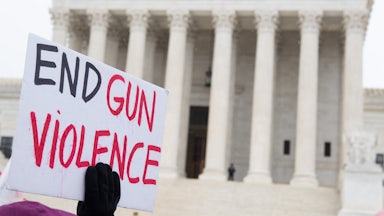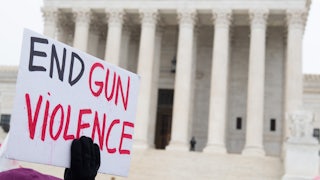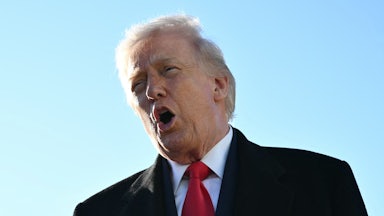For liberal leaders of all stripes, branding “polarization” as a dire threat to “democracy” is a constant meme. It was the central motif of President Joe Biden’s abbreviated reelection campaign, repeated most recently at his October 4 press conference. However, liberal leaders have been less prone to showcase a banner likely to broaden their non- and bipartisan appeal—namely, that the MAGA right’s antidemocratic shenanigans are threats to “the Constitution.”
It’s a missed opportunity. Ordinary, even apolitical Americans revere the Constitution, its text and its Framers’ design, as “secular scripture.” But contemporary Democratic and liberal politicians have studiously avoided speaking to that widespread faith; they have long declined to articulate a legally credible and politically marketable liberal vision of what the Constitution means, let alone deploy such a vision in support of their policy and political goals.
Within the last year or so, though, liberal political leaders, including President Joe Biden and nominee Kamala Harris and her campaign, have begun to shed their colleagues’ traditional timidity about calling out the Supreme Court, as its radical right supermajority nixes their policies and hobbles their constituencies. Still, they remained reluctant to offer substantive challenges to the right-wing justices’ blatant misinterpretations, circumventions, or flat-out disregard for constitutional or statutory provisions.
This year Representative Jamie Raskin has proven to be an exception. In May, Raskin rolled out punchy but weighty critiques of the right’s mangling of legal text and Framers’ design. Others, notably Senators Dick Durbin, Sheldon Whitehouse, Ron Wyden, and Representatives Jerrold Nadler and Hank Johnson, have also called out the justices’ excesses and proposed remedial measures. But these instances of pushback remain anomalies.
Liberal leaders’ allergy to Constitution-based messaging is especially puzzling given their adversaries’ yen for junking cherished constitutional precedents, provisions, and, indeed, the Constitution itself. Right-wing luminaries—from politicians like Donald Trump and Josh Hawley to influential intellectuals like First Things’ founding editor in chief Richard Neuhaus, and the Claremont Institute’s insurrectionist-coddling cheerleaders—have been disarmingly blunt about their eagerness to ignore, truncate, or literally “terminate” the nation’s fundamental law. Their declared endgame is to lock in theocratic authoritarian government empowered to “establish” a national state religion—the very first taboo prescribed by the First Amendment.
As several observers have documented, while the overwhelming majority of Americans find the particular religious regime this new right seeks to impose abhorrent, the likes of Leonard Leo, J.D. Vance, and kindred acolytes of the secretive far-right Catholic society, Opus Dei are—solely—enamored of it. In Project 2025, this band of constitutional subversives have brazenly unfurled their detailed blueprint for permanently “wresting the levers of power [from] liberals—the vile and amoral current-day barbarians, secularists, and bigots, [agents of] the devil.”
If the architects of Project 2025 by hook or crook gain power for the next four years, the Supreme Court has now made clear that it cannot be relied upon to scotch attempts in a Trump White House or MAGA-dominated House or Senate to cancel the Constitution. As echoed across the ideological spectrum, in the court’s end-of-term presidential immunity head-scratcher, Trump v. United States, Chief Justice John Roberts’s opinion shed all pretense of maintaining the legal right’s long professed “originalist” fidelity to text and the Framers’ design. Liberal originalist scholar Akhil Amar wrote that the decision turns the Constitution “inside out and upside down, saying things that are flatly contradicted by the document’s unambiguous letter and obvious spirit.” On the right, conservatives have echoed Professor Michael Rappaport’s acknowledgment that “presidential immunity does not accord with [the Constitution’s] original meaning.”
Liberals must step into the breach and defend the Constitution. Without question, they are now the de facto party of this secular faith. Republicans are the anti-Constitution party, at war with the Founders. Democrats and liberals need to drive this 180-degree reversal of the two parties’ long-perceived posture into the electorate’s consciousness.
To do this, they need to follow the lead of Raskin and those few other liberal politicians, by bringing their case into public view, and offer support to the liberal justices—who have been clamoring for help from kindred politicians, without as yet finding many takers.
Further, liberal politicians can find inspiration from the nation’s most popular Democratic political leader, former President Barack Obama. Obama’s second inaugural address was entirely devoted to a slick but sophisticated—and originalist—defense of twentieth- and twenty-first-century liberal regulatory and safety net reforms. “The patriots of 1776,” he gibed, “did not fight to replace the tyranny of a king with the privileges of a few … a free market only thrives when there are rules to ensure competition and fair play.” At the time, no liberal politician so much as noticed their president’s Constitution-draped thrust—although two Republican senators, Alan Simpson and Chuck Grassley, caught on and assailed it.
Finally, as I and others have written, liberal icons of the past—think Franklin and Theodore Roosevelt, Abraham Lincoln, and original Framers such as Hamilton, Madison, and Jefferson—fought fiercely contested political wars over the meaning of the Constitution, by brandishing astute but adroit characterizations of legal text and Framers’ design. In 1937, after the reactionary Supreme Court invalidated FDR’s first round of New Deal reforms, he opened his next fireside chat by brandishing the Constitution’s relevant text, quoting the dissenting opinions, and concluding, “I want—as all Americans want—a Supreme Court that will enforce the Constitution as written, [not] amend the Constitution by … judicial say-so.” This is the torch his current heirs must carry now.
It is well within the grasp of liberal and Democratic leaders to spur the requisite tectonic shift in public perceptions of the parties’ respective fidelity to the rule of law. In particular, the Harris-Walz campaign would find that adding constitutional messaging to its tool kit would be a seamless and positive fit.
First, however, contemporary liberals must squarely confront and shed their inhibitions. They must match their adversaries on the right by mobilizing potent political support for preserving—or restoring—a liberal constitutional regime. To do this, they must persuade relevant sectors of the polity that their ideas actually match up with provisions of the Constitution and the design of its Framers.
In effect, that requires brandishing originalist arguments. As Robert Post and Reva Siegal, both ardent liberal legal academics, first elaborated in 2006, originalism, whatever its merits as legal theory, has proven to be extremely valuable as a political stratagem. This should not be surprising: Lay audiences are likely to be swayed by direct, straightforward, commonsense-seeming appeals to legal—especially constitutional—text and the design of the people who wrote or ratified that text. Many liberals have long been accustomed to equating originalism with conservative positions and results. That’s a habit they need to shake.
Apart from clinging to an outdated mindset, there is a deeper, less tractable impediment to liberals’ donning the mantle of the Constitution—ideological hostility. In many quarters of the left, the Constitution and Framers—in particular, the original, “Founding Fathers” cohort of Framers—are held in anything but reverential regard. As Nikole Hannah-Jones put it five years ago in her introduction to The New York Times’ 1619 Project, “This nation’s white founders set up a decidedly undemocratic Constitution that excluded women, Native Americans and black people, and did not provide the vote or equality for most Americans.”
Such skepticism has buttressed and been reinforced by the spread of identitarian ideology that rejects the Constitution’s liberal, Enlightenment-based individual-centered precepts of liberty, equal opportunity, fairness, and procedural due process safeguards. As described by the leading comprehensive account—Yascha Mounk’s 2023 The Identity Trap, this credo, driven by “a deep pessimism about overcoming racism or other forms of bigotry, [prefers] public policies that explicitly distinguish between citizens on the basis of the group to which they belong” and dictates that “both private actors and public institutions must make the way they treat people depend on the groups to which they belong.” (Emphasis mine.)
Moreover, historian James Davison Hunter sees this tribalist perspective as both a prime cause and manifestation of the fierce “polarization” currently engulfing American politics. Hunter attributes this threat primarily to a newly radicalized right, but—significantly—by leftist identity politics-peddlers as well. However, liberal advocates and political leaders, virtually without exception, have not acknowledged, let alone criticized, such polarization-incubating threats to the Constitution coming from the left. Rather, most liberal advocates and politicians have acquiesced to or otherwise suppressed any misgivings about the implications of these left illiberal currents—in particular, their potential to undermine constitutional democracy in the long run, or quite plausibly, the not-so-long run.
But while Hunter laments, plausibly, that the tribes now dividing the American electorate have no internal incentives to brake this centrifugal dynamic, his claim that there exists no discernible external institution intent on or capable of reversing that accelerating downward spiral is less convincing. Here, the Democratic Party is well positioned to right the ship. This is seen in the collaborative, legislation-producing business model of its congressional caucuses, its rallying around pragmatic leaders of the center-left—and especially as recast in the current presidential contest.
The Harris-Walz campaign proclaims an emphatically inclusive frame, undergirded by commitment to big-tent unity within the party at all levels. The 2024 Democratic National Convention highlighted unprecedented appeals to and by Republicans disaffected from their party’s antidemocratic, anti-constitutional, fact-free modus operandi in the 2020 election cycle, exponentially more dire for 2024. The campaign has sought and paraded support from independents and Republicans, both ordinary voters and scores of high-profile leaders, including disaffected senior members of the Trump administration.
Most telling, Harris’s centering her “Opportunity Economy” mantra affirms an individualist economic regime that sidelines tribalism. Her 82-page Economic Plan document trumpets “a future where everyone has the opportunity not just to get by but to get ahead … from buying a home to starting a business and building wealth.” This is the rhetoric of individual opportunity—not group-measured results. Indeed, it echoes talking points that could have been found in policy pronouncements of pre-Trump Republicans. In case anyone missed the point, on September 25, Harris told an applauding audience at the Economic Club of Pittsburgh, “We need to engage those who create most of the jobs in America. Look, I am a capitalist. I believe in free and fair markets. I believe in consistent and transparent rules of the road to create a stable business environment.”
This conspicuous shift to the center is paying off, doubling Harris’s share of the Republican vote, to 9 percent in the most recent Times-Siena poll—a spurt credited by Jonathan Chait with “creat[ing] an even chance of victory out of certain defeat.”
The one piece missing from this “well executed strategy” is the recognition and embrace of the constitutional foundation for the Harris-Walz agenda.
The original 1789 Constitution enumerated highly specific powers enabling Congress to construct the legal framework essential for a broadly prosperous national market—powers to regulate interstate and foreign commerce, to establish uniform bankruptcy laws “throughout the United States,” to “coin money,” to “fix the standards of weights and measures,” to “punish counterfeiting [federal] securities and coin,” to “establish post offices and post roads,” and to issue patent, copyright, and trademark protections for authors and inventors.
As authoritatively summed up by Chief Justice John Marshall, in McCulloch v. Maryland, “No inconsiderable portion of the industry of the nation are entrusted to [the federal] government,” such that the “prosperity of the nation so vitally depends on the due execution” of its “ample powers.”
Marshall’s decision upheld the first statute in an “internal improvements” (“infrastructure” in current parlance) master plan labeled the American Plan by its principal champion, Senator Henry Clay—“one of the most historically significant examples of a government-sponsored program to harmonize and balance the nation’s [economy],” according to the U.S. Senate Historical Office. Three and one-half years ago, New York Times columnist David Brooks labeled “the Biden Project” an “updated, monster-sized … revival … of Clay’s ‘American System’ … to secure two great goals: economic dynamism and national unity.” This hard-wired genealogical connection would of course encompass Kamala Harris’s expansion of Biden’s national industrial policy initiatives. As a widely perceived crack lawyer, she should have no trouble making the case that her plan fulfills responsibilities authorized by the Constitution and prioritized by its Framers.
In effect, Harris’s outreach strategy constitutes a U.S. adaptation of the center-left–center-right coalitions that have defeated populist far-right insurgencies in Britain and France, and are working toward that end in Germany. In all these countries, political establishments are defending a version of liberal governance that comprises, as elaborated by Fareed Zakaria in a new history, Age of Revolutions: Progress and Backlash From 1600 to the Present, a pastiche of government-protected “individual rights and liberties [and regulated and safety-net cushioned] open markets.”
But U.S. Democrats face a unique impediment to preserving that liberal order. Even if they gain control of the elective branches, they must then face a Supreme Court given to flaunting unprecedented activist zeal to eviscerate or cripple the federal government’s capacity to execute, in a globalized, internet-linked, postindustrial world, the “vital” role “entrusted” to it by the Founders’ Constitution.
President Biden has belatedly recognized this reactionary Supreme Court as a formidable political adversary. Following this year’s end-of-term, flagrantly a-textual proclamation of presidential immunity for crimes committed while in office, Biden unveiled a three-part proposal for reform: a constitutional amendment to overturn the immunity decision, 18-year term limits, and a “binding, enforceable code of conduct.” Unsurprisingly, Harris embraced this batch of reform proposals—all three of which enjoy strong, even bipartisan, support from experts and voters. However, sensible and popular though they may be, these proposals are unenactable for the foreseeable future.
But liberals may yet retain or restore a constitutional foundation for liberal governance. It just will be a long slog. As noted above, Raskin has mapped out a practical way forward—an expressly originalist vision more persuasive than the legally bogus one offered by the right: “If you read the Constitution, and the Bill of Rights and the subsequent amendments, the vast majority ... have been democratizing amendments.” It’s only the “later amenders” who have “reconfigured the system,” liberal originalist scholar Akhil Amar explains.
Raskin offered four operational rules of the road liberal leaders need to travel. First, writing game-changing constitutional interpretations into law requires political mobilization. There are, the congressman wrote, “political, moral, ethical, and social movements in American history that infuse the law, infuse the legislatures in Congress, infuse the presidency, and infuse the courts, and it’s our job to create the movements that will put the Supreme Court back on the side of freedom and equality and justice in the people.”
Second, this task is big and will take a long time and require incessant mass persuasion. Hence, no magic bullets, no diverting time and energy on fantasy nonsolutions like court expansion or junking the Electoral College.
Third, getting that job done means keeping high-impact court battles near the top of voters’ minds and their political priorities. Judicial atrocities such as Dobbs and Trump v. U.S. have made this task easier.
Fourth, liberals must repeat ad nauseam that the Constitution mandates flexibility to address changing circumstances and values. As Chief Justice Marshall expounded, ours is “a Constitution intended to endure for ages to come, and consequently to be adapted to the various crises of human affairs … to provide for exigencies which, if foreseen at all, must have been seen dimly, and which can be best provided for as they occur.”
It’s true that the men who wrote the Constitution did not successfully live up to the promise of its ideals. It’s fair to say that all of us who’ve come after have found it challenging to fulfill their aspirations as well. But the words written down in our founding documents are not easily erased—and they are free to be claimed by anyone who’d champion their cause. If the right has forsaken the Constitution, the Harris-Walz campaign can assume the mantle, justly cast its Opportunity Economy agenda as adapting, to twenty-first-century exigencies, bedrock constitutional guarantees for a democratic republic and individual freedom.










